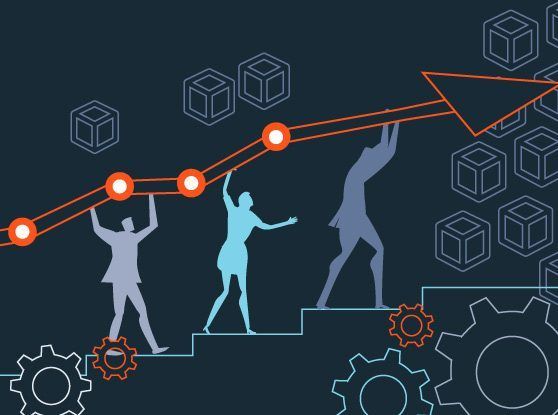Insight Partners' Growth Gurus series showcases inspiring leaders from our portfolio of ScaleUp software and internet companies. In this episode, Nicole Shimer, an Insight investor, interviewed Mark Faggiano, CEO of TaxJar. January 2019, Insight Partners proudly announced a $60 million growth equity investment in TaxJar, a fast-growing sales tax automation company for eCommerce businesses and developers.
Nicole: Let's start with a bit on your background. TaxJar is your fourth startup! Did you always know that you wanted to be an entrepreneur?
Mark: I did. Even at an early age, I always had the sense that I wanted to control my own destiny and start a company without really any good idea of what that meant. I grew up in the 80's and 90's when kids didn't dream of starting a software company.
It wasn't until after college when I got exposed to the Internet and e-commerce that I became excited about starting a web-based business.
Nicole: What inspired you to build TaxJar?
Mark: A few things. I had started other companies and one of the things that I always found rewarding was helping other small businesses be successful, having been a small business owner myself.
Around 2010, software as a subscription (SaaS) businesses were becoming more prevalent. I was fascinated by the fact that you could setup a business and let it run. Having started a web develop business, a more service-based business, I liked that with SaaS you could just focus on building the best product.
Nicole: You built this company to be a 100% remote business, which is Insight's second investment that's has a fully remote team (the first is Automattic aka Wordpress). Why did you decide to build the team that way?
Mark: When we started the business, it wasn’t a conscious effort to be remote.
The folks that were involved in starting the company with me, none of us lived in the same place. We had all worked with each other previously and working remote was the fastest way to get started.
To bring our employees together, we hosted a team retreated called JarFest. Almost every employee at the event mentioned how life-changing it was for them to be able to work on something cool, work with people that they liked, to be challenged, and have the freedom to work from home. That was a big moment. It was the moment we decided that we were onto something and that we were committed to be a remote company and all the things that come with that.
Nicole: How do you create a company culture with a fully remote company, particularly as you've scaled from the first few employees to over sixty?
Mark: My generic answer is that we try to hire people who have similar values around work. That doesn't necessarily mean that they have similar backgrounds or that they don't have a diversity of thoughts or background, but that they want to like who they work with and be challenged. If you put those two things together, then they're most likely going to do great work.
It just so happens that they're also passionate about working remotely for a whole host of different reasons, whether it be they need flexibility around taking care of a family member or they're tired of commuting. They also could live in a community that's not near a city with limited job opportunities, but they're excited to work in technology.
We’ve been able to build this culture by staying consistent to the qualities that we believe allow a person to do well at the company.
Nicole: What is it like to attend JarFest? From your perspective, what makes a successful JarFest?
Mark: It’s a great event that we host twice per year where our employees get to take a break from work and get to know the people that they see on a screen every single day.
We used to use the week-long event to align on strategy and be productive, since we were all in the same location. Now, it’s become more about getting to know each other and what makes all of us tick. I see it as an opportunity to reward our employees for the amazing amount of hard work that they put in.
Nicole: Let’s switch gears a bit to discuss scaling TaxJar. What was your go-to-market strategy when TaxJar first started and how will that change going forward?
Mark: One of the two things that we really committed to was building the very best product that we could. We understood that if we could build a moat around the product and make it better than anything else on the market, then we would have a huge competitive differentiator. We looked at ourselves as a technology company, not so much as a tax company. That was a new approach to our space. We've let the customer be in the driver's seat for the way the product has been built. Historically, we've done a good job of listening to what is going, to allow customers to trust us, because taxes are a sensitive thing with any business, right? Nobody wants to get that call from their State Department of Revenue or from their accountant to say that they're being red-flagged and that they're in trouble with compliance.
Another opportunity for us was our ability to educate the world on sales tax. Before we existed, most of the content that was available was either hard to find or hard to understand. Therefore, we decided to build the best content we could to help people wrap their heads around sales tax, which feels like an insane problem that's changing all the time. As a result, we were able to build trust and customers began to try the product because they trusted and understood what we're saying. This also helped us succeed through word of mouth, which has been a tremendous lever for growth.
One of the things we didn't plan on was that 2018 was a crazy year sales tax legislation. People now look to us to be their interpreter, so we now are responsible for educating our community as things are happening in real-time.
Nicole: Is there a story that you can share about a challenge that you experienced when building TaxJar? How did you solve it?
Mark: We’re not unique in the fact that a lot of our success comes down to how well we hire and build a winning team. In our first three years, we struggled to legitimize ourselves with candidates and be able to attract the best people that we could find.
We didn't have a problem receiving applicants because there's such a large pool when you're a remote company. Rather, we spent a lot of time trying to convince people that we were a legitimate business with a big future, so we lost a lot of really good candidates as a result.
We turned the tide when we launched a life.taxjar.com. The sole purpose of the blog was to shed light on what it's like to work at TaxJar and be transparent about the way that we operate. Launching the blog was a complete gamechanger, almost overnight.
Nicole: Before Insight invested in TaxJar, the company had only raised several million of outside capital since you were founded over five years ago. What is your secret to scaling efficiently?
Mark: Being remote is a huge advantage since we’ve never paid a dollar in rent, so that's one major expense that we're able to put aside. We made a conscious decision the last time we raised money, which was four years prior to working with Insight, that it was up to us to become capital efficient because quite frankly raising money takes a lot of time and we had very limited resources. We didn't want to have to do that every six months to twelve months. Call me crazy, but I think one of the purposes of having a business to actually make money.
I never really understood not being profitable and I think pretty much everybody who is with the company early on felt the exact same way. It was an easy sell. We're not going to play the game of raising round after round after round. We are going to become a profitable company and put ourselves in a position so that if we could ever be lucky enough to work with Insight someday that we could tell a good story and decide to partner with a company like that.
Capital efficiency has been important. I always talk about how important hiring is to allow us to scale. You've got to hire the right people, which means you need to develop the right processes so that you don’t need to spend time on turnover. A lot of things are going to go wrong and will break when building a business, but if you have the right team in place, you'll be able to fix things rapidly, especially when you're as technology focused as we are.
Nicole: Why did you decide to fundraise and what factors were most important to you in choosing which investors to partner with?
Mark: Raising money was not on our radar until 2018. We had worked so hard to be capital efficient and profitable, but not coincidentally, with all the things that went on in sales tax last year, we started to see a huge amount of inbound interest in what we were doing as a company.
The demand was so striking and beyond the typical inbound interest that comes in for any company that is growing and doing well, that we felt like we owed it to the company, our employees and our customer to discover if there was a way that we could align ourselves strategically with a partner that would allow us to scale our vision and accomplish our goals in a much faster way. We wanted a partner that would help us avoid making common mistakes that companies at our stage commonly make.
It turned out that Insight was the perfect partner for us. A lot of that is based on fit and value-add. If we were going to team up with somebody, we wanted to enjoy who we were working with through good and bad times.
We had an advantage from our perspective that we weren't raising money out of need and we didn't need to necessarily change anything. From day one, Insight understood that. We were not looking to change the playbook. Instead, we wanted an investor to help us grow faster and be smarter about making decisions. Between the incredible value-adds that Onsite brings and yourself and all the folks that we've met, it was really an easy decision for us to move forward and to get excited about the next chapter in TaxJar.
Nicole: It’s exciting and humbling to hear that. How will the company use the new capital to continue fueling the growth that you're already seeing and serving to your customers?
Mark: One of the greatest things about our partnership with Insight is that we can think more long-term about building our team. Right now, we are building a team to be in place by Q4 ‘19, so that they are ready for success in January 2020.
We’re also excited to take TaxJar Plus to the market, which is our mid-market solution that has been incredibly successful in a short amount of time. We’re excited to double down there both with the team and technology, since we see as this a big area of opportunity for us.
FIRE ROUND QUESTIONS
At the end of your career, what do you want to be known for?
Being helpful.
As you have scaled your company, how has TaxJar made an impact?
Hopefully we've made e-commerce easier for a heck of a lot of entrepreneurs and small businesses by eliminating something as intense and stressful and chaotic as sales tax compliance.
What motivates you?
Winning. We like to win.
Growth Gurus
Listen to other interviews with inspiring leaders from Insight Partners' portfolio!
LISTEN














